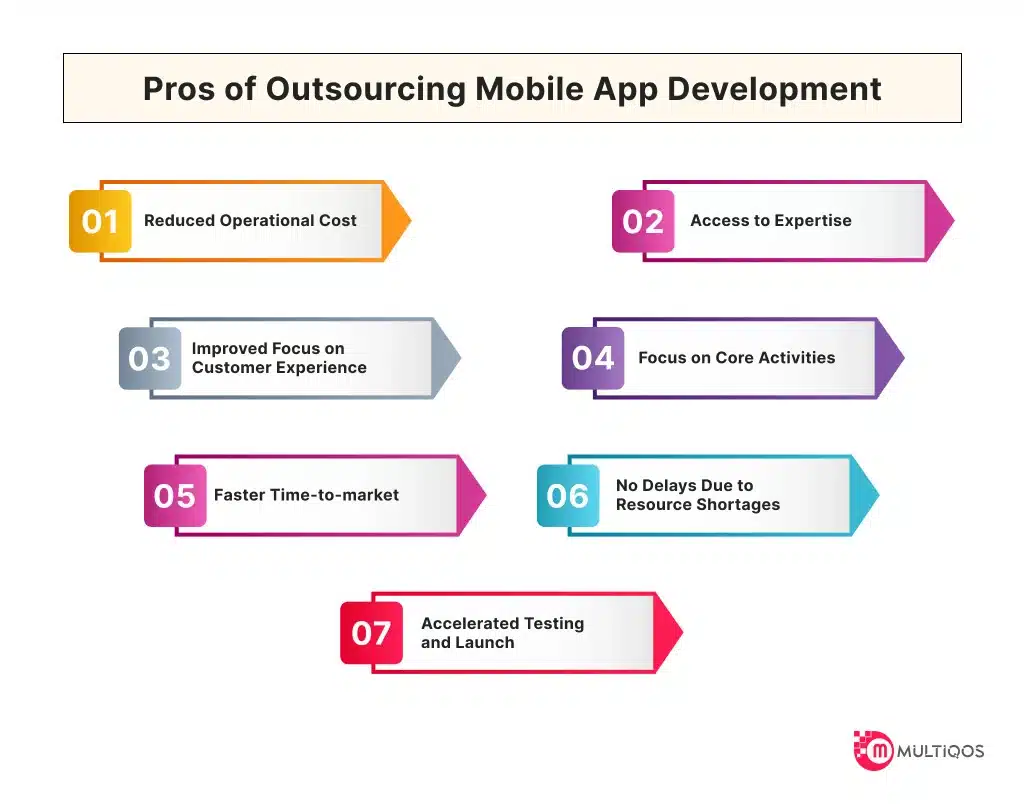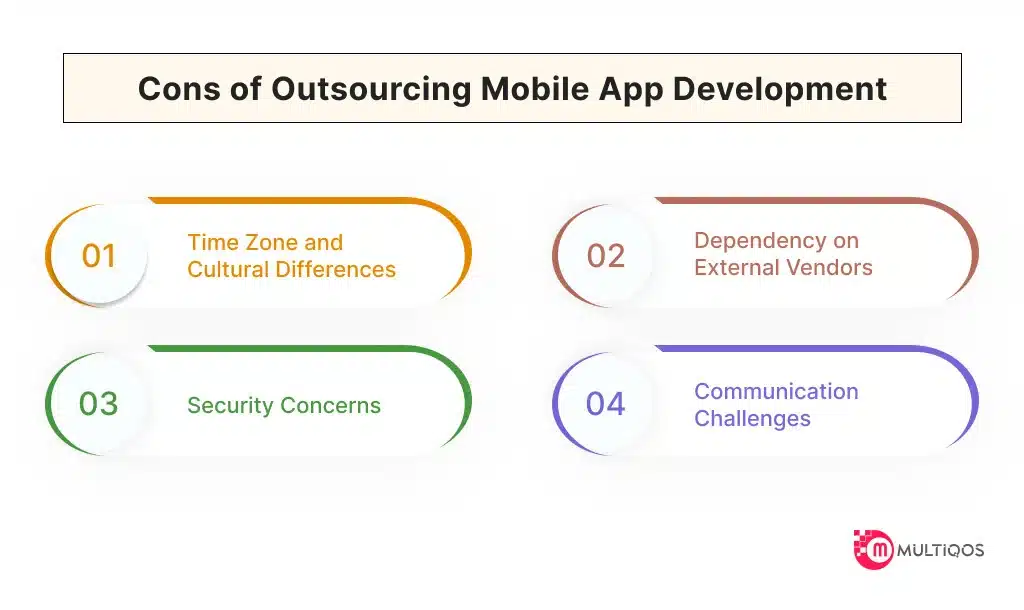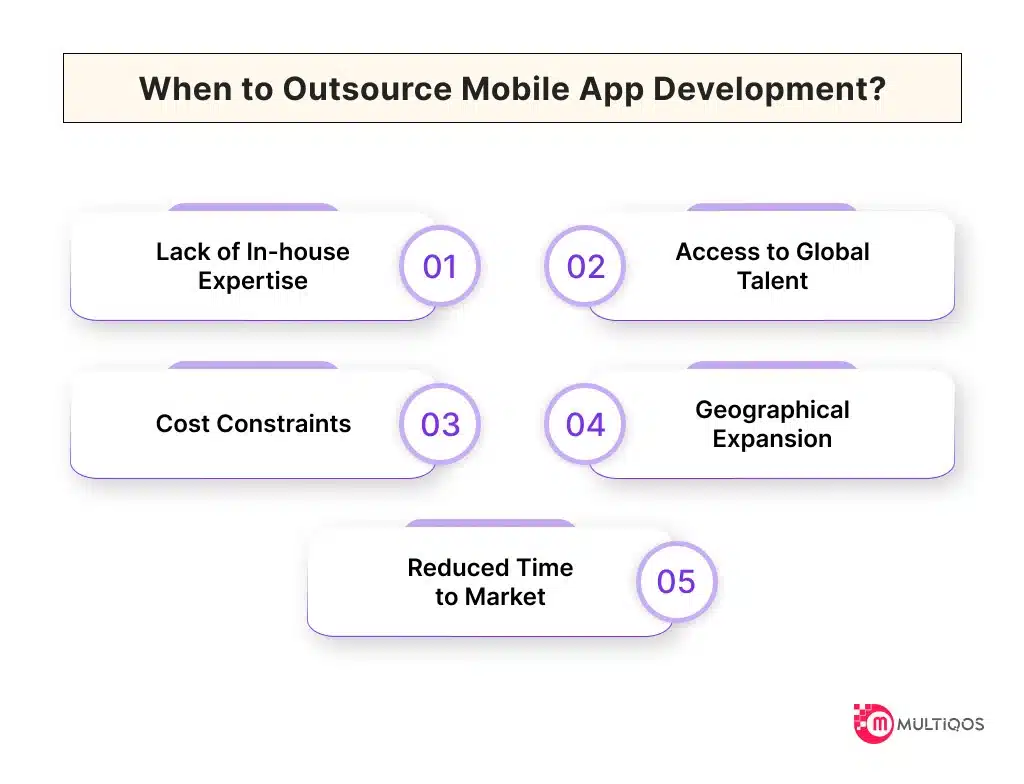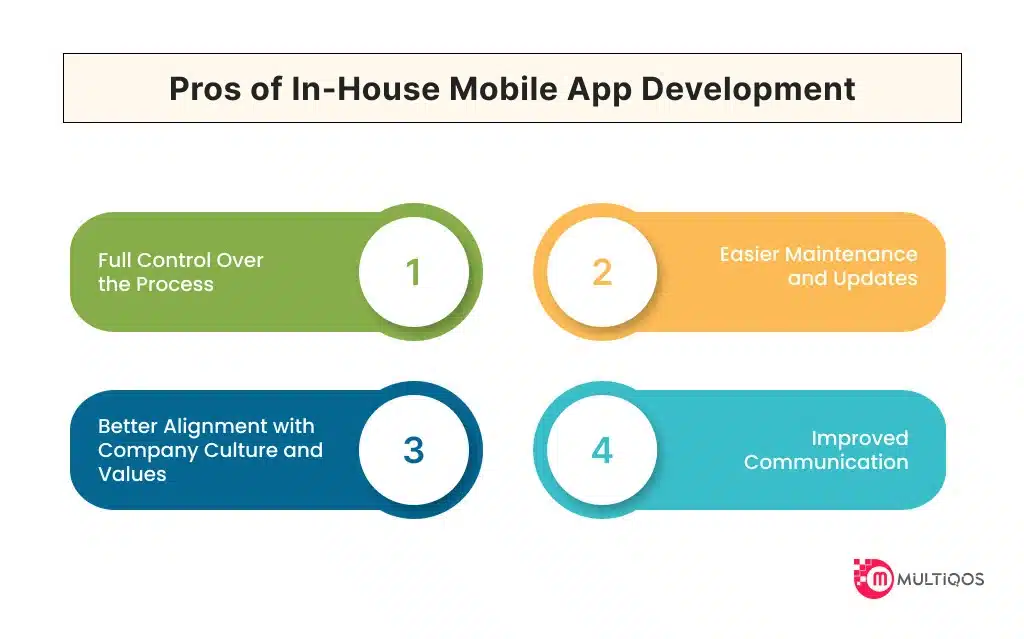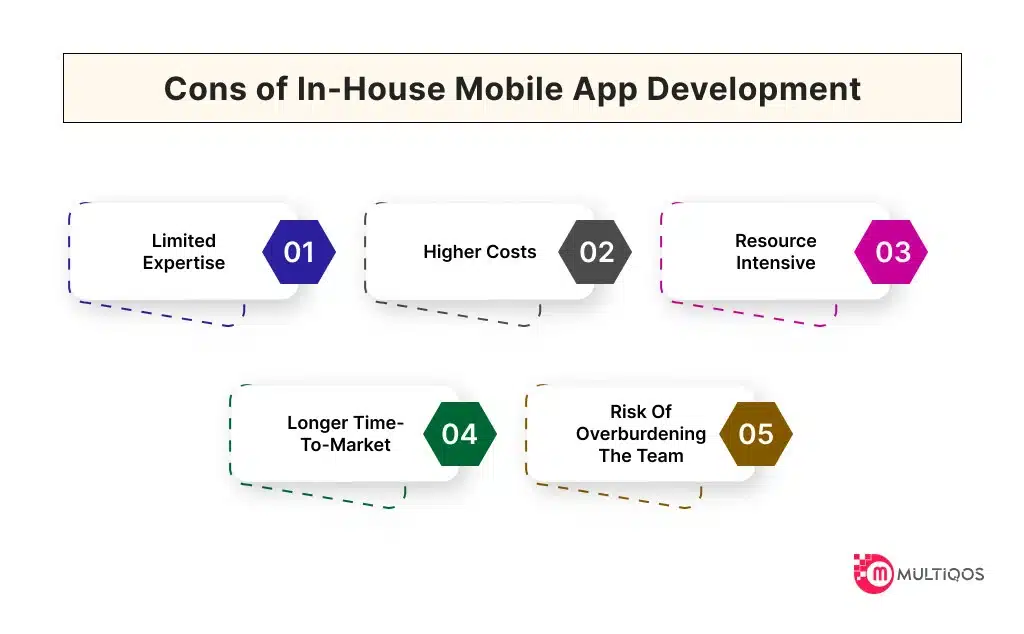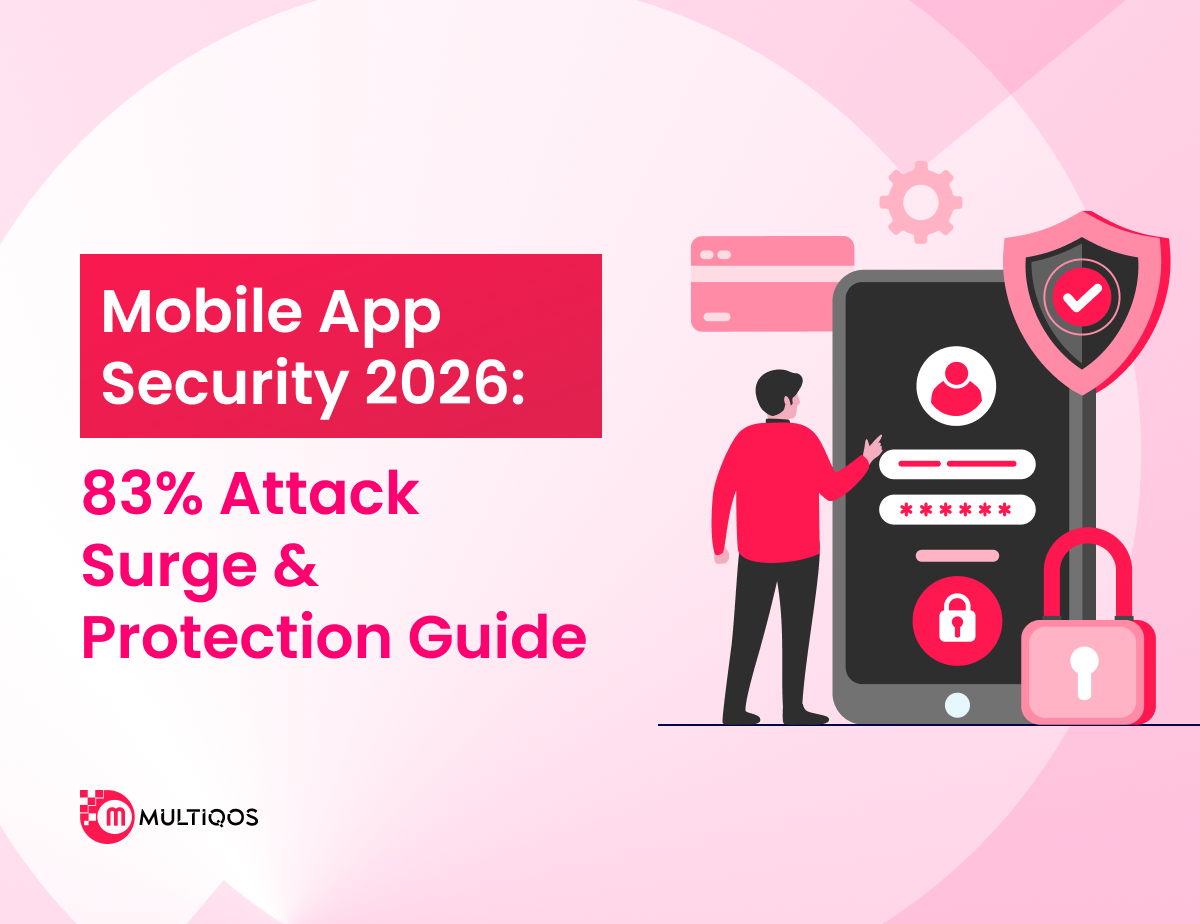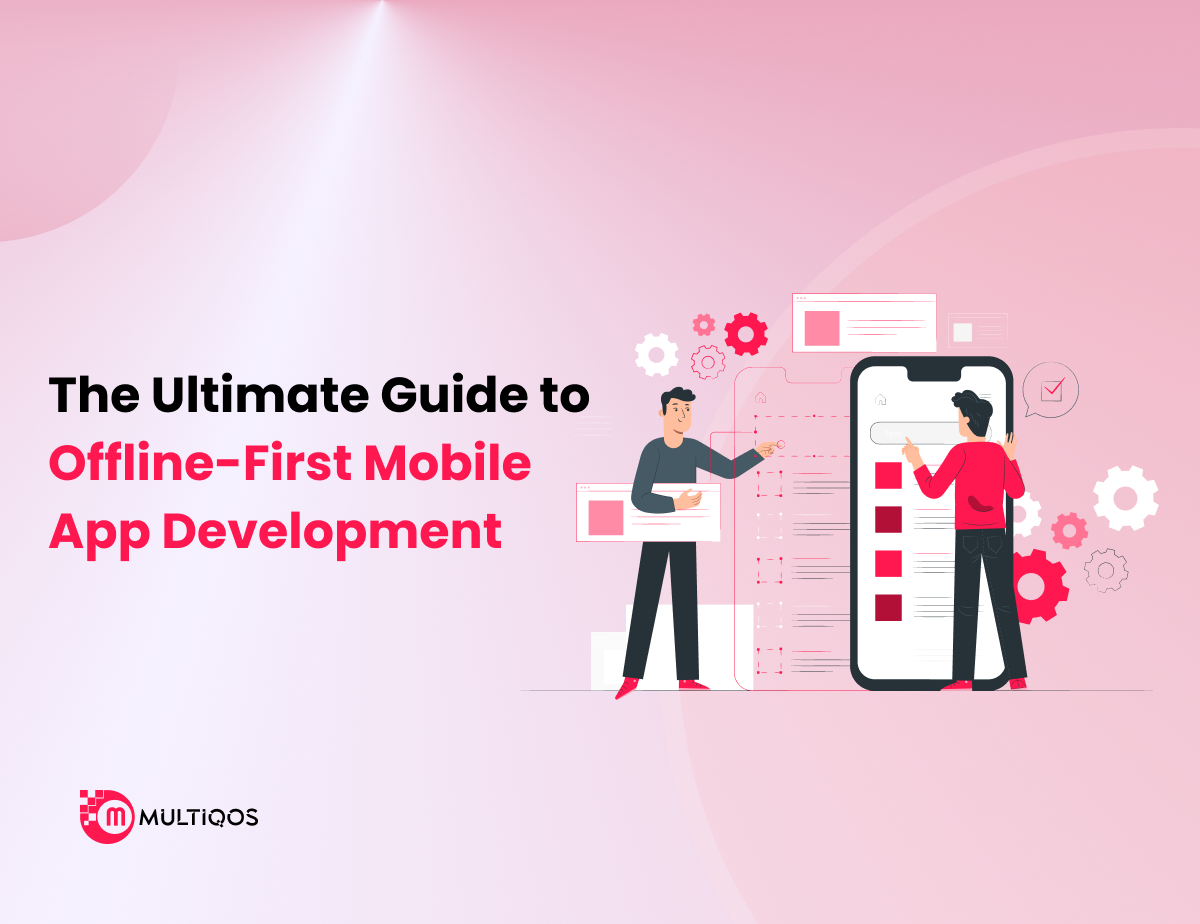In-House or Outsourcing: Which is Better for Mobile App Development?
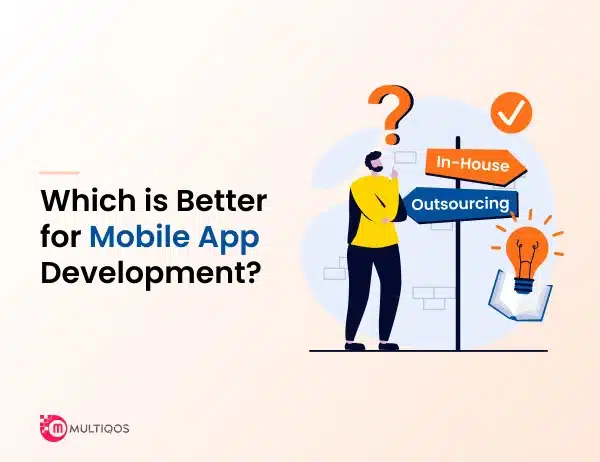
Table of Content:
- In-House vs. Outsourcing: Why It Matters
- Outsourcing Mobile App Development: Overview
- Pros of Outsourcing Mobile App Development
- Cons of Outsourcing Mobile App Development
- When to Outsource Mobile App Development?
- In-House Mobile App Development: Overview
- Pros of In-House Mobile App Development
- Cons of In-House Mobile App Development
- When Is It Ideal to Develop a Mobile App In-House?
- In-House vs. Outsourcing: Comparison Chart
- Why Choose MultiQoS to Outsource Mobile App Development?
- FAQs: In-House vs. Outsourcing
Quick Summary:
Companies must choose between developing mobile apps with their in-house team or partnering with external developers for project completion. Both options have their advantages and drawbacks. To help you choose the top pick, here is a detailed article to help you select an approach that suits your project needs and long-term goals.
Introduction
Businesses starting mobile app development projects must choose between handling everything internally or hiring professional developers to create their apps. Deciding which development approach to use will affect your project results, and both have their unique strengths and weaknesses.
Understanding how external developers or a dedicated in-house development team operates helps you make smarter choices about your app’s future development path.
Why Deciding Between In-House and Outsourcing is Crucial for Your Business?
One of the most crucial decisions a business should make is choosing between in-house development and outsourcing mobile app development for business. Working with the best approach will directly affect the cost, timeline, quality, and overall success of your application.
We all know that mobile app development is a time-consuming and challenging process that requires excellent technical expertise to develop a feature-rich mobile application. For this, you must have a dedicated team of professionals including software developers, designers, project managers, testers, and business analysts.
Alongside this, mobile app development costs a substantial amount. It can start from $10,000 and go up to $300,000. Throughout all phases of development, you need to collaborate with your project team and check progress. When developers neglect their duties and choose the wrong development method, they generate negative results including:
- Budget overruns
- Delayed timelines
- Quality concerns
- Poor resource utilization
- Data privacy risks
- Limited scalability
- Misalignment with business objectives
- Competitive disadvantage
Startups and businesses that work on a limited budget cannot afford the negative impact of poor hiring or choosing the wrong development approach.
To understand how they differ from each other and which approach suits the best based on your project requirements, let’s understand both in-house and outsourcing approaches in detail.
Outsource Mobile App Development: An Overview
Mobile app development outsourcing refers to the practice of hiring third-party developers to manage the mobile app development process rather than managing it in-house. Organizations turn to outsourcing mobile app development because it helps them find unique skills at a lower expense while bringing products to market sooner.
In fact, studies show that the global business process outsourcing market is expected to reach USD 525.23 billion by 2030. Also, outsourcing can reduce mobile app development costs by 30-50%, depending on the region and scope of the project.
Hiring external developers lets you develop top-notch mobile apps while avoiding ongoing expenses for building your own team. But how?
Let us discuss the pros of outsourcing to understand this in detail:
Pros of Outsourcing Mobile App Development
1. Reduced Operational Cost
When companies hire third-party developers they can significantly save costs. When organizations work with external developers, they are not required to create their own app development team and invest in recruitment, benefits, salaries, and training.
Contracting external development teams enable companies to get their product built at lower costs while maintaining high standards. By hiring experts at lower costs, businesses achieve savings between 30% to 50% that they can use for further development.
2. Access to Expertise
When you outsource mobile app development, you have access to highly skilled experts from all around the world. When you choose to outsource your app development in India, it allows you to choose developers whose skillset matches your project needs.
Having your app built using modern tech skills ensures that it meets industry standards and stays updated. You can get this work done without hiring professionals for it.
3. Improved Focus on Customer Experience
When businesses outsource app development, they can dedicate extra time to understanding how to improve customer satisfaction without worrying about the specific tech requirements.
They are capable of handling the entire development process while the in-house team focuses on designing functionalities, user research, and customer feedback that aligns with the evolving market conditions.
Apps with strong user experience design appeal better to customers and align well than those built without design in mind.
4. Focus on Core Activities
You can stay focused on sales, marketing, and customer service when you outsource mobile app development activities. Your in-house team may find it difficult to focus on core business needs when they invest their time and resources into building a mobile app.
Hiring an external development team will help you to keep your business assets focused on core tasks that drive success.
5. Faster Time-to-market
When you outsource your mobile app development process, you can get products faster. Outsourcing gives businesses faster product delivery since experienced partners have proven tools and methods to simplify application development and quality assurance.
Having global teams in multiple time zones can enable round-the-clock work, speeding up project timelines. Companies respond better to customer needs quickly and protect their market position against rivals.
6. No Delays Due to Resource Shortages
Companies save time and solve their internal staffing shortages by sending work to external professionals. Internal teams can face delays due to limited expertise.
When you outsource mobile app development tasks, you can add talent to your project as needed so the work stays on schedule. By hiring outsourced developers, you can adapt your staffing to meet deadlines and develop an excellent app without interruptions.
7. Accelerated Testing and Launch
When you choose to outsource your project, you can benefit from accelerated testing and faster app launches. Numerous outsourcing service providers have dedicated software QA teams set up that can begin testing at an early stage of development and identify errors and bugs faster.
This approach helps minimize the risk of quality control delays due to post-launch issues and ensures that the app is tested thoroughly across multiple devices before it is live. As a result, your product is ready to launch and meets high standards of reliability and performance.
Cons of Outsourcing Mobile App Development
1. Time Zone and Cultural Differences:
Work schedule differences between time zones create slower feedback exchanges that increase project duration. Different cultural backgrounds working on the same project often lead to varied work values, expectations, and business standards.
2. Dependency on External Vendors:
When you depend on an external mobile app development team for ongoing IT tasks, you build long-term support requirements. Problems with product updates may arise when the relationship with the external team ends, or the team becomes unavailable.
3. Security Concerns:
Companies face significant risks when they give sensitive information to outside teams. Before working with outsourced partners, you must thoroughly check their work, but there is always the potential for misuse or unauthorized access.
4. Communication Challenges:
When working with an external team, without effective communication, usually suffers due to different time zones and countries. Communication problems can arise, and valuable information might get lost in translation.
When to Outsource Mobile App Development?
1. Lack of In-house Expertise
When your team needs help with mobile app development, you can find external experts instead of building the skills of your in-house developers from scratch which requires both time and money. Hiring external developers helps you build advanced apps easily while utilizing new technology platforms such as AR/VR, AI integration, etc.
2. Access to Global Talent
Your access to worldwide developer talent enables you to find the best available professionals to support your project. Finding specialized professionals through outsourcing becomes easier when you cannot hire them locally.
3. Cost Constraints
Working with overseas developers helps you save money because their labor rates are lower than what you would pay for a complete staff within your own company. Having this option works best for those needing a solid app that matches their small funds.
4. Geographical Expansion
When you want to enter new markets, especially from overseas clients, outsourcing helps your app with localization and makes it work on various devices with different cultural preferences. A team you outsource to will make sure your app connects with customers in their target markets.
5. Reduced Time to Market
You can reach your app launch faster with external development help. Specialized outsourcing companies know how to develop software better and faster with a streamlined process and specialized knowledge.
In-House Mobile App Development: An Overview
You build and run your app development project inside your own company with an in-house development team of developers and designers to create the application. Companies can better guide their mobile app development project yet still face certain obstacles when using this method.
The direct control of app development works best when you want your project to serve your business’s purpose. You can respond fast to feedback and change product features right away without depending on outside support teams.
In-house development offers long-term advantages such as easier management but demands strong investments in talent training to succeed against rapid industry changes.
Pros of In-House Mobile App Development
1. Full Control Over the Process
A key advantage of creating mobile apps within your company is that you maintain total control over every project aspect. When you keep all development work within your own team you can see daily progress and make changes to keep the effort focused on achieving your project goals.
2. Easier Maintenance and Updates
Working with your in-house developers, lets you handle app updates more effectively. When your development team works on your app they solve problems faster since they don’t need to wait for external support.
3. Better Alignment with Company Culture and Values
Your in-house team understands company culture which helps them build apps that resonate with your brand identity. An internal development team lets your app carry your company identity through its design and usability so it fits naturally alongside all your other offerings.
4. Improved Communication
Teams within the organization can work more easily because communication goes smoothly. No special attention is needed to deal with different work hours across zones since internal teams share a common basis. The team shares ideas in ways that make work progress faster and more productive to fix issues quickly.
Cons of In-House Mobile App Development
1. Limited Expertise
Although your internal team is talented it may need specialized skills to support advanced app features or emerging computing platforms. Setting up internal skill development takes time and slows the development project when team members are learning new technology frameworks.
Depending on the project needs you will need to train your team more or add skilled professionals to your workforce.
2. Higher Costs
Creating an app in-house can be significantly expensive as compared to outsourcing. You must spend on paying developers, designers, and other related experts to create an app.
An internal team requires continual money to purchase development essentials. Startups and new companies often face substantial mobile app challenges because they must pay for both initial development and ongoing support to keep their app running.
3. Resource Intensive
When your team creates apps internally the project needs many skilled workers and significant financial support. Hiring and training workers who know how to build software successfully takes away from other business activities.
Developing a technical team distracts companies from running their main business operations when they lack tech expertise.
4. Longer Time-to-market
An internal development team working on multiple projects plus lacking rapid development experience makes internal mobile app construction take longer than outsourcing.
Time problems occur when team members need training or to handle other business tasks before the project begins. In fast-paced fields, businesses can lose market advantages or miss recent product trends if their mobile app development takes longer.
5. Risk of Overburdening the Team
Small in-house teams handle many tasks which can overwhelm them with workloads. When you give them too many tasks they become overloaded and may develop symptoms of stress or burnout while doing their work poorly.
Your in-house team will find it hard to reach milestones and fix problems when they lack enough workers or time to create your app.
When Is It Ideal to Develop a Mobile App In-House?
1. When You Have Specific, Long-term Needs
An internal mobile app development team helps you make regular updates to your app while keeping the product development process consistent.
2. When Security and Privacy Are Critical
Developing the app internally is more suitable when sensitive data needs protection because your team can better safeguard what they build.
3. When You Need Full Control
If you need complete authority to develop the app yourself with an in-house team, you can monitor progress easily while making rapid changes during each stage.
4. When You Have Sufficient Resources:
If you have financial resources to retain and hire dedicated development team for your project such as developers, designers, and project managers, then building an in-house team is a great option.
Comparison Chart: In-House vs Outsourcing
| Aspect | In-House | Outsourcing |
| Specialized Experts | Limited Expertise | Wide Expertise |
| Cost-Efficiency | Expensive | Affordable |
| Scalability | Challenging | Easier |
| Time-to-market | Slower | Faster |
| Flexibility | High | Moderate |
| Communication | Direct | Challenging |
| Risk of Turnover | High | Low |
| Technology Trends | Lagging | Cutting-Edge |
| Lag Time | More | Less |
| Long-term commitment | Strong | Variable |
Why Choose MultiQoS to Outsource Mobile App Development?
With MultiQoS, you will get outstanding mobile app development services with a team of professional developers, who have immense technology knowledge to build successful mobile apps for multiple sectors with demonstrated results.
If you are planning to enhance your existing mobile app or have a fresh idea to start a project from scratch, our expertise and experience ensure that the app will be future-proof, fully functional, and well-optimized for performance.
Our team is committed to delivering products that meet your unique and complex business requirements and exceed user expectations in the competitive tech ecosystem.
We follow a customer-centric approach and guarantee seamless communication by working closely with our clients and bringing their ideas to life.
At MultiQoS, we focus on transparency and provide regular updates and feedback at each development stage to make sure you’re always in the loop. So, if you are a startup or an enterprise business, outsourcing your mobile app requirements to us, you can sit back, relax, and will ensure a seamless and efficient experience from the initial stage to project completion.
FAQs: In-House vs. Outsourcing
You get better financial results when you choose to hire outsourced professionals from other countries or freelancers. By outsourcing, you eliminate unnecessary expenses for office space and team benefits. Building an in-house development team demands higher costs since you must pay team members plus hire and retain them over time.
Yes, you can switch from outsourcing to in-house mobile app development but the process might be difficult. The shift requires cooperation between outsourced teams and internal developers during knowledge transfer. Planning beforehand prevents both schedule overlays and unexpected costs.
Security is our top priority as we adopt all recommended industry best practices and measures. We ensure your app security by using secure coding methods alongside encryption and privacy law regulations. Our team uses NDAs to keep your intellectual property safe while we build your app.
Yes, we can step in at any stage of your project. We will step in to take over the project if your in-house team has already started development and we’ll complete their audit to keep the project going. We handle project advancement smoothly by supporting knowledge sharing between teams.
Get In Touch


